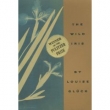 My first read of this little book of poems left me haunted. The title poem, presented first, seems to encapsulate the whole experience for me: I felt as though I were plunged into someone else’s completely well-formed line of thought and therefore that if I could only stay with it long enough, I was bound to understand (prosaically speaking) “what was going on.” The themes of life, death, and emergence–and the constant desire of my mind to reflect back to the title, the idea that this was about a flower–represent my experience of the book as a whole.
My first read of this little book of poems left me haunted. The title poem, presented first, seems to encapsulate the whole experience for me: I felt as though I were plunged into someone else’s completely well-formed line of thought and therefore that if I could only stay with it long enough, I was bound to understand (prosaically speaking) “what was going on.” The themes of life, death, and emergence–and the constant desire of my mind to reflect back to the title, the idea that this was about a flower–represent my experience of the book as a whole.
Throughout the work, it seems clear that pairs of entities are coming to terms with each other, but I was not always certain which pairs: husband and wife, gardener and plant, God and man, or, most abstractly, creator and creation. The book weaves through cyclical patterns of plants/flowers, seasons, and two types of prayer (vespers in the evening and matins in the morning). The poems themselves, individually, almost seem to cycle as well.
I was stunned at Glück’s ability to hang a thought on a well broken line, how perfectly selected everything was, how honest yet spare. In the end, the work left me humming simultaneously with sadness and hope–but more sadness than anything, the kind of sadness I sometimes feel amidst intense beauty; a kind of homelonging, the weight of separation. I have found in it a reflection of my own current struggle to come to terms with some of the recent profound events in my life, with God, and with art. The book poses more questions than answers, leaves more out of focus than clear. In the end, it seems to communicate a sensibility, as though I know this writer’s voice like my own.